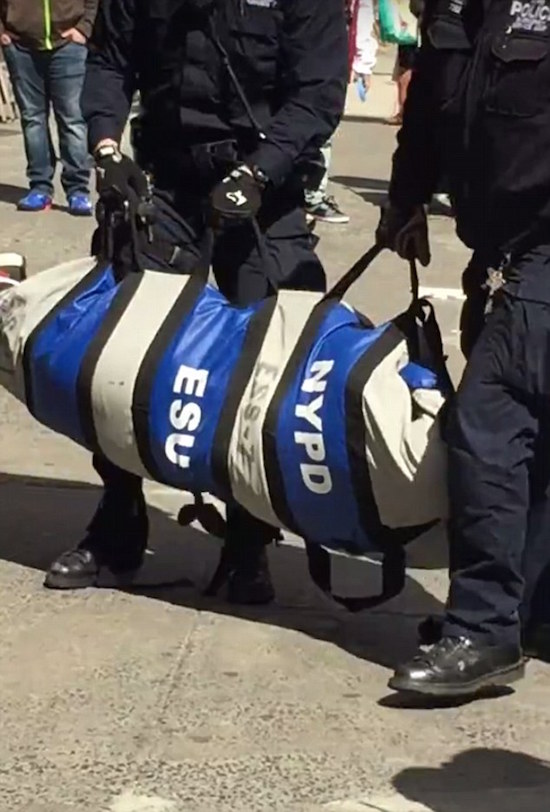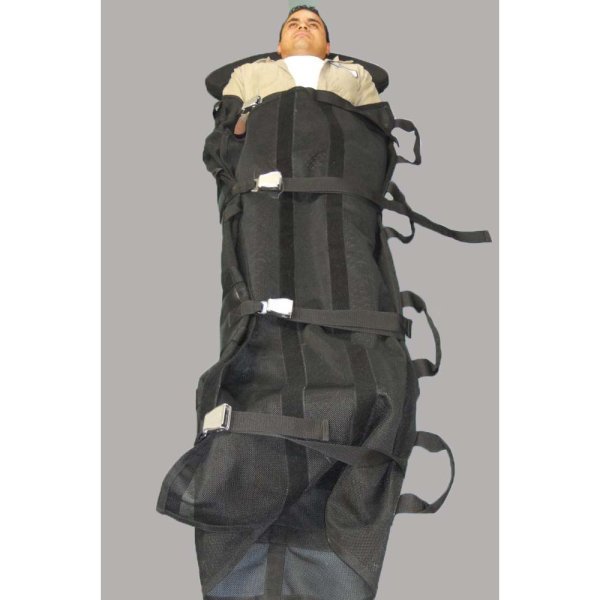
(9-15-16) Yesterday I reprinted a letter from a father about how Crisis Intervention Team trained officers had treated an individual in the midst of a crisis with respect despite the verbal abuse that he was yelling at them. I am writing today about a completely different experience for individuals in New York City who are deemed “emotionally disturbed.”
Individuals with mental illnesses are being restrained in a mesh bag commonly called “the burrito.”
News about the restraining device surfaced earlier this year after a bystander posted a cell phone video of it on Youtube. (See video at end of blog.) The video shows a man lying on the ground with his ankles and legs bound with orange tape with both hands secured behind his back. He is surrounded by New York City Police officers who, after searching him, lift him onto a white body bag and bright blue lettering that they then zip around him, completely enclosing his body and head with only his feet extending from the end. After he is restrained mummy style, he is transported.
The full body restraint bag is being marketed under the name EDP Bag, an acronym for Emotionally Disturbed Person bag, and was created specifically for the NYPD, although it now is being marketed to other departments for $899 by a company called DeSantis Gunhide.
On the manufacturer’s webpage, the EDP Bag looks less menacing than the enclosed capsule that NYPD officers used to restrain Johnell Muhammad, who The New York Times reported had been suspected of failing to pay a subway fare. When officers tried to arrest him, he flailed his arms, kicked and spit at them. Mr. Muhammad struck one officer in the head with his elbow; another was injured trying to subdue him, the police said, and he had two pipes with crack cocaine residue in them when he was wrestled to the ground and searched.
The NYPD said it received 44,000 emergency calls about emotionally disturbed people between January 1 through April 20 of this year and deployed the bags 122 times, or about once per day. The bag reportedly has been used on persons who are belligerent because of drug use but also on persons who are mentally ill and autistic.
The manufacturer said the bags are well ventilated and while incapacitating a person, the fabric is strong and allows fluids to pass through, and can be cleaned and decontaminated easily after each use. Seven handles make it easy to manage and carry.
Community activists said using the bags was both “dehumanizing ” and “dangerous.” Individuals in the midst of a psychological crisis, especially veterans, might associate the EDP bag with a body bag used in wars to transport the dead. Stuffing an individual into a bag results in additional trauma and stress.
Andrew R. Miller, a lawyer for Mr. Muhammad, denounced the officers’ actions in the Times, calling them “excessive and totally unreasonable.”
“He was the victim of the assault, instead of the other way around,” Mr. Miller said.
A defender of the bags said the restraints were “an imperfect solution to very difficult situations. There are no great options.”
In the past decades, mental health groups have lobbied for an end to all restraints in hospitals in favor of quiet rooms, but restraint chairs are commonly used in jails and prisons, and now this new device is being marketed to law enforcement. The manufacturer reported more than 500 of the bags had been sold, mostly to the NYPD.
Carla Rabinowitz, an advocacy coordinator for Community Access, which helps people with mental illnesses, has called on the NYPD to stop using the bags. So far, her request has been denied. I am not aware of any national mental health organizations joining in the call for the bags to be discontinued.

Manufacturers’ photo makes the bag look less threatening, by showing head revealed, but in practice only the feet are exposed and the head is completely covered.



